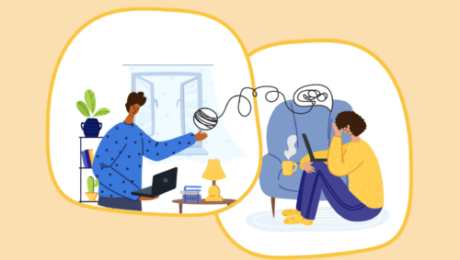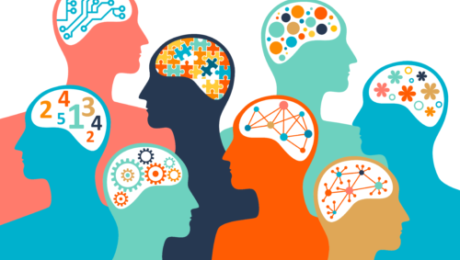EAP – The Benefit You Might Be Forgetting

By Alison Nelson, Employee Benefits Account Manager
Many employers offer a Long-Term Disability (LTD) policy to their employees, which allows people to maintain a portion of their income if they are no longer able to work. But did you know that most LTD policies include an additional benefit that can be used, even if you don’t have an LTD claim? This benefit is called an Employee Assistance Program.
An Employee Assistance Program (EAP) is a confidential program that allows you, or anyone in your household, to talk to a professional for any number of things that could impact your mental or emotional well-being. EAPs are a fantastic resource for counseling, stress-management, personal and professional relationships, grief, trauma, and so much more. If a family member become diagnosed with a serious illness, you can contact your EAP for help managing that stress and finding resources for that family member.
Most people don’t think about their Long-Term Disability policy unless they need it, which makes it easy to overlook the associated benefit of an EAP. Even if you don’t have an LTD policy, it’s worth checking with your Benefits Administrator to see if you have an EAP available to you. Mental health is something I’m very passionate about (I even wrote two blogs about it, here’s Part One and here is Part Two). I believe incredibly important to provide resources that aid in the mental and emotional well-being of employees and their families.
Not only does an EAP assist employees, it can help businesses to increase productivity and reduce employee absenteeism! After all, an engaged and productive employee is healthy AND happy. Here is an article that dives into the benefits of an EAP, which can be an all-around win-win. If you’d like to learn more, please don’t hesitate to reach out to RISQ Consulting!
- Published in Blog
PSYCH 101 – Anxiety
This article is from RISQ Consulting’s Zywave client portal, a resource available to all RISQ Consulting clients. Please contact your Benefits Consultant or Account Executive for more information or for help setting up your own login.

Experiencing occasional anxiety is normal. However, if your feelings of anxiety are extreme, last for an extended period or interfere with your daily life, you may have an anxiety disorder. People with anxiety disorders frequently experience intense, excessive and persistent worry and fear about everyday situations.
Although often used interchangeably, anxiety is not the same as fear. According to the American Psychological Association (APA), anxiety is a future-oriented, long-acting response broadly focused on a diffuse threat. At the same time, fear is an appropriate, present-oriented and short-lived response to an identifiable and specific threat.
Keep in mind that anxiety also is not interchangeable with stress. Both are emotional responses, but stress is generally caused by an external trigger (e.g., a work deadline, conflict or chronic illness). These terms are often confused since anxiety leads to similar symptoms.
The National Institute of Mental Health estimates that 31% of Americans will experience an anxiety disorder during their lifetimes. There are several types of anxiety disorders, and having more than one simultaneously is possible. When excessive anxiousness lasts more than six months, it is then considered and treated as an anxiety disorder.
Here are some of the most common anxiety disorders:
- Generalized anxiety disorder (GAD) includes persistent and excessive anxiety and worry about activities or events that are often ordinary or routine. These stressful feelings can jump from topic to topic, occurring most days. GAD is diagnosed when a person worries excessively about various everyday problems for at least six months. Physical symptoms accompanying this condition include fatigue, headaches, irritability, nausea, frequent urination and hot flashes.
- Panic disorder involves repeated attacks of terror, known as panic attacks, usually accompanied by a pounding heart, sweating, dizziness and weakness. During these attacks, a person may flush or feel chilled, their hands may tingle or feel numb, and nausea or chest pain may occur. Panic attacks usually produce a sense of unreality, a feeling of impending doom or a fear of losing control. They can occur at any time, even during sleep. Some people who experience panic attacks become so fearful that they refuse to leave home. When the condition progresses this far, it is called agoraphobia—a fear of open spaces.
- Social anxiety disorder is diagnosed when individuals become overwhelmingly anxious and excessively self-conscious in everyday social situations. People with this phobia have an intense, persistent and chronic fear of being watched and judged by others and doing things that will embarrass them. They may worry for days or even weeks before a dreaded situation. Many individuals with social phobia realize that their fear is unwarranted but are still unable to overcome it.
- A specific phobia is an intense and irrational fear of something that poses little or no threat, such as heights, escalators, dogs, spiders, closed-in places or water. Similar to social anxiety disorder, individuals understand these fears are irrational, but feel powerless to stop them. The causes of specific phobias are not well-understood, but symptoms usually appear in childhood or adolescence and continue into adulthood.
The causes of anxiety disorders aren’t fully understood. For example, life experiences can trigger anxiety disorders in people already prone to anxiety. Inherited traits may increase a person’s chance of developing an anxiety disorder or anxiety could result from a medical condition that needs treatment. The APA notes that women are more likely to experience anxiety disorders than men.
In general, anxiety disorders are treated with medication, therapy or both. Before treatment begins, a doctor must conduct a careful diagnostic evaluation to determine whether an anxiety disorder or a physical problem causes a person’s symptoms. Sometimes alcoholism, depression or other coexisting conditions strongly affect an individual, and treating their anxiety disorder must wait until those conditions are controlled. Those with anxiety disorders usually try several different treatments or combinations of treatments before finding the one that works for them.
Anxiety looks and feels different for everyone, so it’s important to understand how anxiety can present itself. Common symptoms of anxiety include the following:
- Anxious thoughts that are difficult to control
- Fatigue
- Irritability
- Restlessness
- Sleep problems, such as difficulty falling or staying asleep
- Trouble concentrating
- Unexplained aches and pains
Anxiety may not go away on its own and can worsen if left untreated. Many people will experience an anxiety disorder at some point in their lives, and, fortunately, they are very treatable. If you feel like you’re worrying too much and these feelings are interfering with your work, relationships or other aspects of your life, contact your doctor or a mental health professional.
- Published in Blog
Mental Health in the Workplace, Part 2

By Alison Nelson, Employee Benefits Account Manager
In case you couldn’t tell from this article I wrote last year, mental health is something I am very passionate about. I aspire to contribute to the destigmatization of mental health, especially in the workplace, in whatever capacity I can. When I recently read this article stating that only 19% of employees used their mental health benefits in 2022, I was saddened, but not shocked by that statistic. The article goes on to say:
“A new report by One Medical and Workplace Intelligence, which surveyed 800 employees and 800 human resources (HR) professionals, found that, not only did over nine in 10 (91%) employees tell surveyors mental health was negatively impacting their productivity, but the usage of benefit offerings already in place by employees was extremely low. Less than a fifth (19%) of employees said they used their mental health care benefits in 2022.”
Why don’t employees utilize their mental health benefits? According to Business Wire, it may be because employees undervalue their mental health and tend to reserve benefits for more urgent needs. In other words, people tend to prioritize their physical health over their mental health. I hypothesize that this is, in part, due to the differentiation between physical healthcare and mental healthcare. They are often discussed as two completely different disciplines, but, in truth, mental health IS health.
According to the Mental Health Foundation, “one in three people with a long-term physical health condition also has a mental health problem, most often depression or anxiety.” Physical health and mental health are two sides of the same coin and should be treated as such. If an employee can call out sick when they have the flu, they should also be able to call out sick due to an anxiety attack.
Employees should be able to take mental health days, and one way an employer can encourage that is by implementing a separate mental health policy. Having a separate bucket of mental health days can help encourage employees to recharge without forcing them to choose between taking a day or powering through a panic attack, just in case they spike a fever and need a sick day down the road.
This survey conducted by Breeze in 2022 indicates a number of interesting things, but most notably:
- 63% of employees have taken a mental health day in the last year
- Nearly half of all people who took a mental health day fibbed to their employer on why they needed the day off out of fear of being judged
- 50% of employees left their jobs in 2021 for mental health reasons, including 68% of millennials and 81% of Gen-Z
Adding a mental health policy to your business’ employee offerings is a great way to support employees and show that you care about their entire wellbeing. There is also the additional benefit that employees who take mental health days are less stressed, which results in long-term productivity. No one should feel embarrassed about taking a mental health day. Having a specific policy in place for mental health is a step in the right direction to end the stigma. Here is a great article that lists some other ways employers can implement a mental health policy to support employees and end the stigma. Remember, mental health IS health.
- Published in Blog
Ctrl + Alt + Del
By Elva Perez, Employee Benefits Account Specialist
Ctrl + Alt + Del. This keyboard combination is crucial when you need to reset your computer at work, yet interestingly, it’s also the best way to reset another very important computer. Your brain.
Control, Alt, Delete:
- Control yourself
- Alter your thinking
- Delete negative thinking
The last blog I shared was about the 6 steps I practice in my daily life to help me find peace of mind. After practicing the steps on how to achieve inner peace, I do feel like I have become mentally stronger. I have been working for the past 13 years on living a positive peaceful life, and some of these practices have now become second nature. Yet it can be a struggle not to fall back on old ways or practices when our surroundings seem to pull us back down.
While adding those steps was beneficial, they were all just things that I needed to start doing. Things that I needed to add to my mental routine. But just adding better practices doesn’t always lead to the best result. You must also delete the poor ones. Sometimes we have to Ctrl + Alt + Del our brains to restart fresh.
The article linked below stood out to me because it wasn’t about adding to our practices. It was about identifying the behaviors we needed to free ourselves from in order to make room for the better ones. The negative practices that need to be deleted in our brains.
10 Things Mentally Strong People Give Up to Gain Inner Peace | Inc.com
I know life is not perfect and it will always be an active effort to keep my brain programed for inner peace, but you know what? I am perfectly ok with that.
- Published in Blog
Report: Managers Impact Employee Mental Health More Than Doctors, Therapists
This article is from RISQ Consulting’s Zywave client portal, a resource available to all RISQ Consulting clients. Please contact your Benefits Consultant or Account Executive for more information or for help setting up your own login.

A new report from The Workforce Institute at UKG revealed that managers impact employee mental health more than doctors and therapists. The study conducted for the report surveyed 3,400 people in 10 countries, including the United States, to explore mental health in and outside work.
Not surprisingly, work impacts employee mental health, and organizational leaders and managers can be critical in supporting workers. Consider the following key findings from the report:
- Work influences mental health the most, according to 60% of employees.
- Managers impact employee mental health (69%) more than doctors (51%) or therapists (41%).
- Managers have just as much an impact on employee mental health as a spouse or partner (69%).
- Mental health is valued over a high-paying job by most employees (81%), and 64% would take a pay cut for a job that better supports their mental wellness.
- Work stress negatively impacts employees’ home life (71%), well-being (64%) and relationships (62%).
The research also revealed that managers are often more stressed than their team members and senior leadership. Companies are encouraged to be inclusive with mental health support and not forget about managers in their efforts.
“Being overwhelmed consumes human energy and impacts retention, performance, innovation and culture. Employers can be the anchor of stability for their people by giving them the support and resources they need—not just what we think they need.”
– Jarik Conrad, executive director of The Workforce Institute at UKG
What Can Employers Do?
Workers want their employers and managers to do more to support mental health. They are also willing to make trade-offs for their mental health, as nearly two-thirds of employees would take a pay cut for a job that better supports their mental health. Fortunately, managers can play a vital role in supporting employees, which can bolster employee attraction and retention efforts. Employers can create supportive work environments by being authentic, building empathy and listening actively to employees.
Contact RISQ Consulting for additional mental health and employee communication resources.
- Published in Blog
Minimum PTO Policies
This article is from RISQ Consulting’s Zywave client portal, a resource available to all RISQ Consulting clients. Please contact your Benefits Consultant or Account Executive for more information or for help setting up your own login.

Many employees do not use their allotted paid time off (PTO) despite their employers’ vacation and other leave policies. As a result, some employers are implementing minimum PTO policies to address this challenge. This emerging trend takes standard PTO policies one step further by mandating that employees take off a minimum number of days each year. When done properly, minimum PTO policies can help curb employee burnout, improve workplace productivity and strengthen attraction and retention efforts.
This article explores minimum PTO policies, including the potential benefits and organizational considerations for developing and implementing these policies.
What Is Minimum PTO?
Minimum PTO—also known as mandatory vacation or time off—is a policy that requires employees to take a minimum number of vacation days each year. While minimum PTO policies can vary by duration and the amount of time employees can take off, they generally take the form of an annual time-off minimum. These policies can establish deadlines for employees to use their PTO monthly, quarterly, seasonally or annually. Employees continue to receive their regular wages when taking time off.
Some employers require employees to take a portion of their minimum PTO over multiple consecutive days. This is known as a consecutive-day policy. For example, an employer may require employees to schedule five of their allotted 15 PTO days consecutively. This helps ensure that employees disconnect from work while away from the office, allowing them to use their PTO for something meaningful and return to work recharged. Consecutive day policies may also allow employees to take time off in smaller increments as long as they take one larger block of PTO each year.
Potential Benefits of Minimum PTO
Many savvy employers are transitioning to minimum PTO to help their employees feel happier and more satisfied at work, which can increase workforce productivity and reduce turnover. Minimum PTO not only encourages employees to use their allotted time off, but it can also strengthen organizations. The following sections highlight some benefits of implementing minimum PTO policies.
Improved Employee Well-being
Employees are an organization’s most valuable resource. By requiring employees to use their PTO, employers prioritize their workers’ mental and physical well-being. Minimum PTO can also help organizations strengthen employee loyalty since it can signal to workers that they’re not required to be online or work outside of expected hours. This can lead to employees feeling valued and, therefore, improve morale. Additionally, because minimum PTO policies help employees recharge, they can improve workplace productivity and safety. A rested workforce will likely be more creative, focused and careful.
Workforce Needs Evaluation
Mandatory PTO allows organizations to evaluate their workforce needs and reveal potential issues. By requiring employees to take time off, employers can learn whether a particular employee is taking on too many responsibilities and if they need to hire additional workers. It can also encourage cross-training by allowing workers to take on new responsibilities and gain experience when their colleagues are away. This can enable knowledge transfer among workers and decrease the risk of losing vital information and experience when an employee leaves. Additionally, since minimum PTO requires all employees to take time off, it can provide employees with opportunities to report workplace issues that they might not otherwise do due to fear or intimidation, such as harassment and bullying.
Reduced Cashflow and Rollover Issues
Minimum PTO policies can provide a positive alternative to use-it-or-lose-it PTO policies. Many regular PTO policies allow employees to cash out or roll over unused PTO at the end of the year. Cash-outs can create cashflow problems for employers, and rollovers can lead to scheduling challenges the following year. Minimum PTO policies can help organizations save money on year-end PTO payoffs by avoiding cash-outs entirely and limiting potential scheduling issues from rollovers.
Alternatives to Unlimited PTO Policies
Unlimited PTO can be a great recruitment tool and may seem ideal for employees, but, in reality, it can be problematic. Employees often struggle to strike a balance between an acceptable amount and an excessive amount of PTO under unlimited policies. As a result, many employees take less time off than they would if their employers adopted minimum PTO policies. As a result, unlimited PTO can cause employee burnout, decreased worker productivity and increased turnover.
Additionally, unlimited PTO policies can be ambiguous or poorly designed, making it more difficult for employees to take time off. Some organizations may have unspoken rules about using unlimited PTO. This is common in industries with demanding work cultures, like banking and finance. These unspoken norms often dissuade employees from taking time off because they may feel unsure or guilty about stepping away from work. By requiring employees to take time off, employers signal to workers and applicants that they value work-life balance, which can improve overall attraction and retention efforts.
Considerations for Implementing Minimum PTO
While minimum PTO can help employees feel happier and more satisfied at work, adopting this approach can create scheduling challenges. Minimum PTO policies require employers to plan ahead because they must address situations where employees may be out for multiple days. In addition to potential scheduling issues, minimum PTO can create hardships for employees by requiring them to increase their workloads when their coworkers are away. This is especially true for small teams and businesses. Employers can address these issues by establishing PTO blackout periods during peak times or predictable busy seasons. They can also train managers to address PTO requests during popular times, such as during the summer and holidays.
When establishing policies regarding PTO usage and blackout periods, employers need to be consistent with how they administer and approve time-off requests. Employers can do this by establishing a written minimum PTO policy that provides employees with details about how to use and request time off. This can include the minimum number of days employees must use each year, whether any days need to be consecutive and the deadlines for using PTO (e.g., monthly, quarterly and annual).
Organizations need to consider how minimum PTO policies may negatively impact employees. Requiring employees to take time off may cause some workers to feel like they’re losing autonomy because their employer is dictating when they must work and when they must take time off. Additionally, forcing employees to take time off can disrupt internal workflow, especially if employees must take time off during the middle of an important project or right before a critical deadline. This could lead to increased stress for employees and create work-related difficulties.
Employers must ensure their minimum PTO policies comply with federal and state law requirements, including timekeeping requirements under the Fair Labor Standards Act. Many states and localities govern how unused PTO must be handled at year-end or when an employee leaves a company. Additionally, legally mandated paid sick leave is becoming more common throughout the United States. Employers need to ensure that their mandatory PTO policies comply with state and local laws regarding paid sick leave.
Summary
Minimum PTO policies can help create a happier and more productive workforce. While requiring employees to take time away from work can benefit employers and employees, it’s vital that employers weigh these policies’ benefits and compliance costs before implementing them to ensure it’s the right decision for their organization.
For more workplace resources, contact RISQ Consulting today.
- Published in Blog
For The Freaking Fun Of It!
By Jennifer Outcelt, Creative Content Architect
For some people out in the adult world, self-care, relaxation, recreation, and creative endeavors are a priority. For others, they are a distant second to career, house work, child care, and curling up on the couch clutching a cell phone paralyzed by pure exhaustion. Sure, each group of adults has sporadic episodes mimicking the other, yet the tendencies seem consistent. I, having previously believed myself to exist in the former group, find that I am in fact part of the latter. I’m offended by this self-realization, yet I don’t seem too sorry about realizing it. It’s hard to complain to myself about myself… they both make such good points!
Basically, my priorities have taken it upon themselves to secretly shift into a realm where any fun activity is paired with guilt. I’ve found myself questioning the value of the time I’ve spent doing anything not directly correlated with an assignment or chore. I watch my 3 year old do 47 summersaults on the couch in a row with nary a care or goal in mind other than sheer delight. My envious eyes have identified her as a possible cause for this shift (though I wouldn’t dare allow an iota of resentment to manifest). Meanwhile, I’ve had a brand new iPad for 2 months that I purchased for the sole purpose of learning to draw digitally in Procreate, and have yet to put more than 8 hours of creative fun into because, “I should probably fold that laundry instead.” With life and all its demands, I’ve been telling myself that fun must be earned… but good luck affording it. Is this the recommended outlook on self-care or fun for fun’s sake? H E double hockey sticks, NO.
There are countless benefits to relaxation and abstract endeavors. For one; stress relief (that one sounds nice). Also, increased energy for other work, more creative thought and problem solving, improved social skills, HAPPINESS, better health, bonding with others, new skills, and dang it all, just way more fun! So with all these benefits, why is it so difficult to jump away from the have-to-dos and dive completely recklessly into the want-to-dos?
Apparently, it’s just a matter of choice. You can convince yourself that any choice is the right one… I obviously convinced myself sacrificing creative art for laundry was the right choice. So why not switch it up and bat for the other team here? They have cooler jersey’s and seem to cheer way more. Plus, their roster is written in glitter pen on the back of a bar tab receipt! After reading an article reminding me of the power of fun (link below), I’m finally ready to be a part of the other team. Team “For The Freaking Fun Of It!”
https://www.nytimes.com/2021/12/23/well/mind/having-fun-suceeding-coronavirus-pandemic.html
- Published in Blog
Combating Imposter Syndrome
This article is from RISQ Consulting’s Zywave client portal, a resource available to all RISQ Consulting clients. Please contact your Benefits Consultant or Account Executive for more information or for help setting up your own login.

Imposter syndrome is a feeling of self-doubt that affects how workers view their abilities and qualifications when they don’t think they belong or deserve their job. It can affect an employee’s work by impairing job performance, contributing to burnout and reducing overall job satisfaction.
In fact, according to the International Journal of Behavioral Science, around 70% of the population has experienced imposter syndrome at least once.
With an increase in remote work environments, imposter syndrome has worsened due to a lack of in-person interaction. Face-to-face interactions can provide feedback through body language, which employees lack when working from home. When working from home, workers can also become distracted by things such as pets and children. Furthermore, these distractions can increase stress and anxiety, contributing to self-critical feelings about job performance.
All of those factors can negatively impact your well-being as an employee. Consider these strategies to help combat imposter syndrome, including when working from home:
- Let negative thoughts come and go. Negative feelings towards yourself are common. To combat the anxiety associated with them, it can be helpful to recognize them and avoid giving them further thought. Avoid being too hard on yourself.
- Get together with co-workers. If there are in-person events at your workplace, consider attending them to interact face-to-face with co-workers. You could also consider scheduling a working lunch or post-work happy hour with a co-worker.
- Talk about your experience. Sharing about your experience with imposter syndrome can help both you and those you work with feel less alone. Share your advice with co-workers to help spread knowledge and awareness.
- Practice positive self-talk. Practicing affirmations and writing down the facts can weed out the false accusations in your head. Write down the positive ways you contribute to your workplace so you can recognize your accomplishments.
- Have self-compassion. Perfection is not possible. When you’re experiencing negative thoughts, it’s essential to be kind to yourself. It’s also important to recognize that you were hired for your role for a reason.
You don’t have to combat imposter syndrome alone. Working remotely can foster feelings of isolation, but imposter syndrome affects millions of workers each year; therefore, it’s important to know you’re not the only one affected. Knowing how to combat it can help you and those you work with.
Prioritizing Your Well-being
In recent years, there has been a shift to organizations allowing employees to work remotely. This remote work option has given employees more time to focus on their well-being. While remote work can help improve overall job satisfaction, it can also have some adverse effects. Some aspects of remote work can negatively impact your mental health and, as a result, affect your physical well-being and job performance.
According to recent research from Zippia:
- Almost half (40%) of remote workers say that struggling to unplug at the end of the workday is their biggest challenge.
- Half (50%) of remote workers feel lonely at least once per week.
Driven in part by this social isolation, remote employees have started to shift towards prioritizing their well-being. With the increase in employees working from home, there has started to be a more significant focus on using extra time that was previously for commuting on other nonwork-related tasks. Some of these activities include extra sleep, leisure activities and home projects.
As a result, focusing some attention on your well-being will improve not only your physical and mental state but also your work experience. To prioritize your well-being, consider trying some of these strategies while working remotely:
- Connect with co-workers. Connecting with others is important when working remotely to combat feelings of isolation. Make time to connect throughout the week by planning meet-ups such as post-work walks or lunches.
- Exercise for 30 minutes daily. Exercise can help boost your mood and improve your overall well-being. Some typical workouts include yoga, biking, walking and stretching.
- Schedule regular breaks. Take breaks throughout your day to help prevent daily burnout. Small breaks in your workday could include taking a short walk or making a snack.
- Create a designated work space. When working in a remote environment, it’s important to have a space designated for work. This space should be somewhere you feel productive, such as a desk. Spaces like your bedroom or couch are associated with relaxation, so they may not be the best locations to be productive during the day.
If you’re a remote or hybrid employee, consider trying some of these tips to help prioritize your physical and mental health.
Every workplace is different, so consider how prioritizing your well-being can fit into your schedule. You could also reach out to your manager or co-workers to discuss prioritizing your well-being.
- Published in Blog
6 Tips For Better Brain Health
This article is from RISQ Consulting’s Zywave client portal, a resource available to all RISQ Consulting clients. Please contact your Benefits Consultant or Account Executive for more information or for help setting up your own login.

A brief lapse in memory, such as misplacing your wallet or forgetting a birthday, is often associated with being overly busy or having an excessive amount of stress. In fact, memory loss is a common part of aging. What can be problematic is when the episodes of forgetfulness increase and intensify into a more severe problem, such as mild cognitive impairment or even Alzheimer’s disease.
This is why taking care of your brain health is essential. There are small daily efforts you can make to slow memory decline. Read on for six tips about taking care of your brain health.
-
Exercise Daily
Physically active people are less likely to experience a decline in their mental function, according to the Mayo Clinic. The increased blood flow to the brain during exercise aids the natural brain connections that occur during aging. A simple routine of 30 minutes of physical activity daily can help boost your brain health. Try choosing an activity that will increase your heart rate, such as hiking, playing tennis or biking.
-
Eat a Balanced Diet
A balanced diet not only helps physical health but cognitive functions as well. Try to incorporate foods high in monounsaturated fats, polyunsaturated fats and omega-3 fatty acids. These foods can include salmon, nuts and avocados, for example. It’s also important to avoid foods high in trans and saturated fats, such as processed foods and fatty cuts of beef.
-
Get a Good Night’s Sleep
Sleep plays a vital role in overall health, including brain health. To get a good night’s sleep, you should aim for seven to eight consecutive hours of rest per night. This gives the brain a chance to detoxify and relax after each day, which is critical for a healthy brain and memory.
A lack of sleep can be a detriment to your brain health. If you’re having trouble sleeping, it can be helpful to reach out to your doctor.
-
Participate in Social Activities
Regular social interactions can help decrease memory loss. This can especially be important if you live alone or work remotely. A simple way to incorporate social interaction into your daily life is to connect with loved ones such as family and friends. If you have time in your evenings, this could be a good opportunity to try a new hobby or class within your community.
-
Activate Your Brain
The more mentally stimulated you are, the better your brain’s overall function will be. To engage in mental stimulation, you can participate in activities such as reading, brain games, painting and puzzles. If you’re looking for where to start with brain-stimulating exercises, reach out to your doctor for recommended resources.
-
Receive Regular Check-ups
Certain health factors, such as artery and vein health, are critical to brain health and function. By going to regular check-ups, you’re able to get your blood pressure, blood sugar and cholesterol checked. Your doctor can tell you if your these and other numbers are in a healthy range. If not, they can provide care to help you get your numbers in a healthy range.
Conclusion
Brain health significantly impacts your memory and cognitive function. Practicing these six habits can positively impact your brain’s health. If you have further questions about how to better the health of your brain, reach out to your doctor for more information.
- Published in Blog












